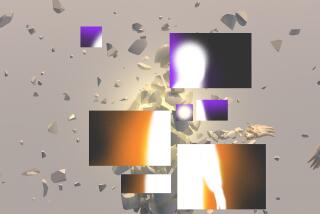A Fantastic Voyage Through the Mind
- Share via
Scientists say that during the last decade they’ve made revolutionary advances in understanding the human mind.
Those familiar with coverage of the O.J. Simpson trial will be surprised to learn that there still is a human mind. Whatever the case, science and the mind merge fascinatingly this week as embattled public television--on the Congressional hit list of a bunch of ranting lobotomies a few billion neurons shy of a full brain--examines the complex cosmos inside our heads.
The happy occasion is four hours of “The Human Quest,” a two-part PBS series produced by KCET, shaped by superb science journalist Roger Bingham and featuring an “A” list of scientists and philosophers.
Its scientific underpinning is Darwin’s theory that our brains, like our bodies, have evolved through natural selection. Its message, as Bingham himself has previously stated, is that humans “are united by the shared evolutionary history” of their minds. In other words, despite our superficial diversity (the series opens like one of those global chorale-on-a-mountaintop commercials for Coke) there is a common human nature. And perhaps Bingham would like to teach the world to sing in perfect harmony.
*
From locales ranging from Ojai to Bali, series host Bingham (whose earlier PBS works include “The Addicted Brain,” “The Time of Our Lives” and “Inside Information”) makes his case vibrantly, creatively and with the verbal and visual eloquence of someone acutely attuned to television’s potential to synthesize intricate concepts and simplify them even for science illiterates. What at first seems intimidating soon becomes a revealing, transfixing X-ray of ourselves.
That’s less the case for Wednesday’s second segment that explores consciousness (never on TV have so many “neuros” appeared in the professional titles of interviewees) and argues that the very process of science leads to enlightenment. However, Tuesday’s program is especially dazzling and seductive in its stress of common denominators.
“Why are we so alike?” asks Bingham to begin the first hour, titled “The Nature of Human Nature.” He replies: “Because culture is not the only force that shapes us.” What follows is a look at the brain circuitry we’re born with, including what Bingham calls the shared “architecture of the mind.” He believes that we are all variations on a theme, but that “there is a theme.”
Even with so much sharing of circuitry, though, there are still seemingly inexplicable gaps that separate some humans. Bingham ticks off and examines some of these mind mysteries, one of which is Williams syndrome, a disorder that significantly retards mental development but curiously not language, drawing and social skills.
A master of humorous metaphors, Bingham travels to England for his section on the “mental maps” that we have inside our heads from birth. His subjects? London’s famous cabbies, who must pass a rigorous exam testing their memory of countless streets and alleys before getting licensed. On the screen, a cabby candidate is asked by an examiner the route he would take to Victoria Station from the British Museum. Without hesitating, he rattles off streets, turns and directions in a low monotone.
Yet why do some of us possess better “memory maps” than others? Alas, Bingham doesn’t say as he enters a London cab en route to his next destination: “University of Iowa, please.”
Titled “The Social Brain,” the second half of Tuesday’s program finds Bingham indirectly intersecting with the National Enquirer, as we hear from him and others about why humans are so interested in each other, to the point of obsession with gossip.
*
It seems our brains make us do it. This validation by science allows us to shed our guilt, and blame our prurient interests on our interior wiring, which is the product of natural selection through the ages, which we can’t control. That means no more Angst over watching the Simpson trial, either.
Our brains are social as well, Bingham says, in that we use them to “organize” the mask we present to others and “decode” the masks others present to us. Bingham links this and other universal mental traits to the survival instincts of animals in the wild, where both prey and predator assume a pose, whether as a defense or part of an offense, that the other tries to read.
Yet, what are we to infer from another of those mind mysteries, this time a woman to whom every “mask” is unrecognizable? Suffering a brain injury as a firefighter, she no longer can recognize faces, including the face of her mother, whom she has just photographed, even though she can identify her mother’s clothes. So bizarre is the woman’s condition that she also cannot recognize even her own face. Shown a photograph of herself, her expression is vacant. Told it’s her photograph, she’s incredulous. “Really?”
You respond with similar wonderment to much of “The Human Quest” and its commentary on the “building blocks of our behavior.” How rare that the airwaves are used so productively, and how tragic should such series become casualties of the nasty, partisan political wars that now imperil PBS.
Like a mind, television is a terrible thing to waste.
* “The Human Quest” airs Tuesday and Wednesday at 7 p.m. on KVCR and at 8 p.m. on KCET.
More to Read
The complete guide to home viewing
Get Screen Gab for everything about the TV shows and streaming movies everyone’s talking about.
You may occasionally receive promotional content from the Los Angeles Times.






